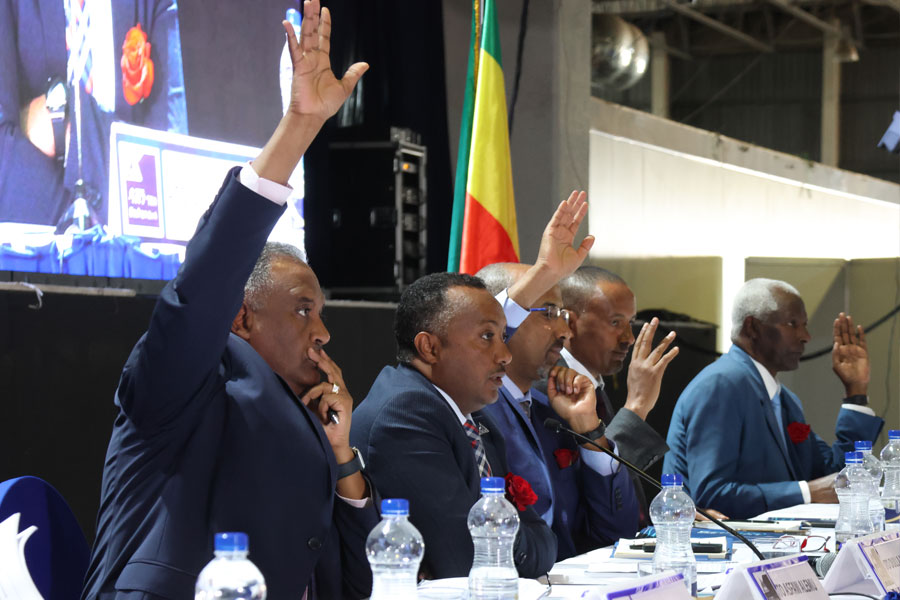
Aug 18 , 2024
By Hintsa Andebrhan
History has repeatedly shown that poor policy decisions can turn economic downturns into full-blown disasters. The Great Depression of 1929-1939, often cited as the worst economic catastrophe of the 20th Century, serves as a prime example. While the Wall Street Crash of 1929 is frequently identified as the initial trigger, many argue that misguided U.S. government policies exacerbated the crisis. Similarly, the 2008 financial meltdown, considered the most severe economic crisis since the Great Depression, was primarily attributed to flawed Federal Reserve policies and irresponsible banking practices.
These events should offer a critical lesson that when governments and financial institutions falter, the consequences can be devastating.
In Ethiopia's current economic and financial turmoil, parallels can be drawn to these American experiences. Prime Minister Abiy Ahmed (PhD) and his administration appear aware of these historical precedents. The Prime Minister recently revealed that his government had agreed with the International Monetary Fund (IMF) to narrow the gap between the parallel market and official exchange rates, a critical issue in Ethiopia's macroeconomic reality. Notably, this strategy does not involve devaluing the Birr against the U.S. dollar or other currencies, a move that could have further destabilised the economy.
However, Prime Minister Abiy also made a startling admission. Senior executives within the banking industry, including those linked to the state, have traded parallel market currency. It is a revelation that should raise serious concerns about the integrity of the financial system and the commitment of its leadership to address these issues.
The situation evokes memories of the 2008 U.S. financial crisis, when the U.S. government was forced to intervene with massive bailout programs to prevent a complete economic collapse. Congress passed the American Recovery & Reinvestment Act (ARRA), a 787 billion-dollar package to relieve banks, consumers, and the unemployed. The package included several hundred billion dollars in tax cuts designed to stimulate economic activities and restore public confidence.
In Ethiopia, however, the response has been less decisive. The Prime Minister's acknowledgement of financial crimes occurring under his watch without accompanying legal action should raise questions about the government's resolve to combat corruption and stabilise the economy. The involvement of government officials in construction deals tied to the parallel currency market only deepens the public's mistrust.
Living under a government that is aware of financial crimes yet takes no action to enforce the law should be more than unsettling. It is indicative of a deeper governance issue. Failing to enforce laws against such practices undermines economic stability and erodes the administration's credibility. This is particularly troubling in a country where the economy is already strained.
Ethiopia's current economic troubles manifest deeper structural issues within the public sector and financial institutions. The lessons from U.S. financial crises can be that economic instability is inevitable when governments fail to act decisively and transparently. The Abiy administration's reluctance to fully address these issues, particularly those related to financial crimes and corruption, is troubling for the country's future.
If his administration wants to avoid the worst-case scenarios witnessed in the United States, it should consider adopting a more proactive and transparent approach to economic governance. This includes implementing policies that promote economic growth and enforcing laws that prevent financial misconduct. If his policymakers lack a robust economic and political strategy, looking to the United States as a model for reviving critical economic sectors is not unreasonable.
During its financial crises, the U.S. government created policies to mitigate economic damage and support consumers and businesses. Washington's approach included strict regulations on financial fraud and money laundering, enforced by the Financial Crimes Enforcement Network (FinCEN), under the direction of the Secretary of the Treasury. This level of commitment to legal and economic oversight is something the Abiy administration would do well to emulate.
Yet, recent developments concerning the National Bank of Ethiopia (NBE) might have complicated the situation. Governor Mamo Mihretu recently told local media that the government had approached the IMF with a proposal for macroeconomic reform and financial assistance. He was quick to clarify, however, that the IMF had not initiated contact with Ethiopia, a statement that appears intended to show Ethiopia's agency in these negotiations.
Governor Mamo's comments might be accurate. But, they do not capture the complete picture. While it may not have "come" to Ethiopia, the IMF is certainly not averse to offering assistance to member countries in need — albeit often on its terms. For instance, the IMF recently approached China with a proposal for a trillion-dollar housing project, an offer that Beijing declined, likely due to concerns about sovereignty under President Xi Jinping's administration.
The deal between Ethiopia and the IMF, which has been dragging on for nearly two years, reveals a lack of preparedness on Ethiopia's part. The IMF's proposed policy reform—a market-based currency market regime—signals that Ethiopia's delegates may have entered negotiations without a strong economic policy framework to protect sovereignty over monetary policy.
PUBLISHED ON
Aug 18,2024 [ VOL
25 , NO
1268]


Viewpoints | Aug 03,2024

Radar | Mar 19,2022

News Analysis | Oct 27,2024

Sunday with Eden | Oct 12,2019

Commentaries | May 28,2022

Commentaries | Mar 26,2022

Radar | Jul 29,2023

Radar | Jul 01,2023

Commentaries | Aug 25,2024

Commentaries | Jun 01,2024

Photo Gallery | 179034 Views | May 06,2019

Photo Gallery | 169230 Views | Apr 26,2019

Photo Gallery | 160109 Views | Oct 06,2021

My Opinion | 137138 Views | Aug 14,2021
Commentaries | Oct 25,2025

Dec 22 , 2024 . By TIZITA SHEWAFERAW
Charged with transforming colossal state-owned enterprises into modern and competitiv...

Aug 18 , 2024 . By AKSAH ITALO
Although predictable Yonas Zerihun's job in the ride-hailing service is not immune to...

Jul 28 , 2024 . By TIZITA SHEWAFERAW
Unhabitual, perhaps too many, Samuel Gebreyohannes, 38, used to occasionally enjoy a couple of beers at breakfast. However, he recently swit...

Jul 13 , 2024 . By AKSAH ITALO
Investors who rely on tractors, trucks, and field vehicles for commuting, transporting commodities, and f...

Oct 25 , 2025
The regulatory machinery is on overdrive. In only two years, no fewer than 35 new pro...

Oct 18 , 2025
The political establishment, notably the ruling party and its top brass, has become p...

Oct 11 , 2025
Ladislas Farago, a roving Associated Press (AP) correspondent, arrived in Ethiopia in...

Oct 4 , 2025
Eyob Tekalegn (PhD) had been in the Governor's chair for only weeks when, on Septembe...

Oct 25 , 2025 . By YITBAREK GETACHEW
Officials of the Addis Abeba's Education Bureau have embarked on an ambitious experim...

Oct 26 , 2025 . By YITBAREK GETACHEW
The federal government is making a landmark shift in its investment incentive regime...

Oct 29 , 2025 . By NAHOM AYELE
The National Bank of Ethiopia (NBE) is preparing to issue a directive that will funda...

Oct 26 , 2025 . By SURAFEL MULUGETA
A community of booksellers shadowing the Ethiopian National Theatre has been jolted b...